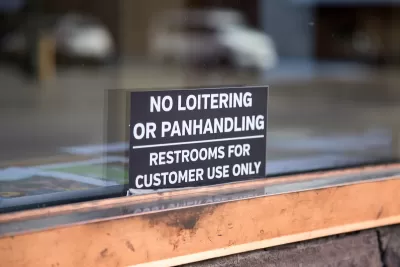Policies that punish and fine unhoused people for sheltering outdoors, even when other shelter is not available, are the most visible but least efficient ways to reduce homelessness.

In an opinion piece for Bloomberg Law, Will Knight argues that “using jailing sentences and criminal fines to address homelessness is ineffective and fundamentally unjust,” calling criminalization an “expensive and shortsighted” policy.
Knight makes the argument in anticipation of the U.S. Supreme Court’s imminent decision on Grants Pass v. Johnson, a case that will decide whether states and cities can criminalize unhoused people that stems in Grants Pass, Oregon, where the city issued $300 fines to people sleeping outside even though housing is practically unavailable and there is no emergency shelter.
“Although evidence shows criminalization to be the most expensive and least effective method, it remains the preferred policy. The hidden costs of this approach—policing, jailing, and clogging courts, not to mention the barriers it creates for individuals seeking housing due to fines or criminal records—are substantial.”
For Knight, “A Supreme Court ruling affirming that people shouldn’t be punished for trying to survive could encourage lawmakers to prioritize actual long-lasting solutions. These solutions should focus on ensuring housing is safe and affordable, rather than rely on punitive measures that don’t address the underlying issues.”
FULL STORY: The US Supreme Court Should End Criminalization of Homelessness

Alabama: Trump Terminates Settlements for Black Communities Harmed By Raw Sewage
Trump deemed the landmark civil rights agreement “illegal DEI and environmental justice policy.”

Planetizen Federal Action Tracker
A weekly monitor of how Trump’s orders and actions are impacting planners and planning in America.

The 120 Year Old Tiny Home Villages That Sheltered San Francisco’s Earthquake Refugees
More than a century ago, San Francisco mobilized to house thousands of residents displaced by the 1906 earthquake. Could their strategy offer a model for the present?

In Both Crashes and Crime, Public Transportation is Far Safer than Driving
Contrary to popular assumptions, public transportation has far lower crash and crime rates than automobile travel. For safer communities, improve and encourage transit travel.

Report: Zoning Reforms Should Complement Nashville’s Ambitious Transit Plan
Without reform, restrictive zoning codes will limit the impact of the city’s planned transit expansion and could exclude some of the residents who depend on transit the most.

Judge Orders Release of Frozen IRA, IIJA Funding
The decision is a victory for environmental groups who charged that freezing funds for critical infrastructure and disaster response programs caused “real and irreparable harm” to communities.
Urban Design for Planners 1: Software Tools
This six-course series explores essential urban design concepts using open source software and equips planners with the tools they need to participate fully in the urban design process.
Planning for Universal Design
Learn the tools for implementing Universal Design in planning regulations.
Clanton & Associates, Inc.
Jessamine County Fiscal Court
Institute for Housing and Urban Development Studies (IHS)
City of Grandview
Harvard GSD Executive Education
Toledo-Lucas County Plan Commissions
Salt Lake City
NYU Wagner Graduate School of Public Service





























